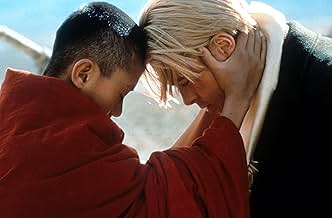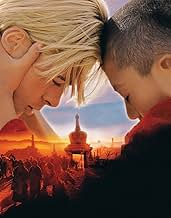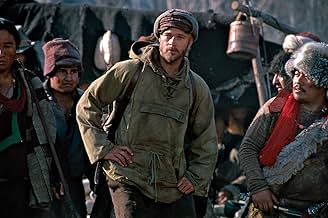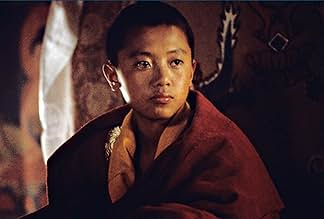La verdadera historia de Henrich Harrer, un alpinista austríaco que entabló amistad con el Dalai Lama durante la ocupación China del Tíbet.La verdadera historia de Henrich Harrer, un alpinista austríaco que entabló amistad con el Dalai Lama durante la ocupación China del Tíbet.La verdadera historia de Henrich Harrer, un alpinista austríaco que entabló amistad con el Dalai Lama durante la ocupación China del Tíbet.
- Dirección
- Guionistas
- Elenco
- Premios
- 3 premios ganados y 8 nominaciones en total
BD Wong
- Ngawang Jigme
- (as B.D. Wong)
Ngawang Chojor
- Lord Chamberlain
- (as Ven. Ngawang Chojor)
- Dirección
- Guionistas
- Todo el elenco y el equipo
- Producción, taquilla y más en IMDbPro
Opiniones destacadas
I saw this film for the first time last night after hearing a great many people recommend it to me. I don't know why I waited so long! This is a soul stirring movie that is perfect in its simplicity. I don't think it's the best performance Brad Pitt has ever offered, but he was quite good. David Thewlis (an amazing actor who never receives as much praise he deserves) gave a perfect performance. But the real beauty of the film is the Tibetan people and their lifestyle. The cinematography was breathtaking and perfectly matched the mood of the film. I loved this movie so much that I'm going to buy it immediately. I love uplifting epic types of movies and this is truly one of the better ones I've seen in a while. In fact, it's one the better movies I've seen in a while.
It's too bad that the movie had to be 139 minutes long. It's not that I can't handle movies that are that long, but when watching longer movies, I expect that it has something to say during that extra time and that's where it sometimes went wrong with "Seven Years in Tibet". It just seemed to keep dragging on forever without contributing to the story.
It needs about 2/3 of the time to show what a bad guy Heinrich Harrer actually is and only 1/3 of the time to show how he changes and gradually becomes a good man. All he thinks about is his career as a mountain climber. In 1939, just before World War II, his wife is pregnant with their first child. Harrer doesn't want to take up his responsibility and 'flees' from her by going to Tibet, where he will try to conquer Mount Nanga Parbat in the Himalayas. Because he is an Austrian and because the Nazi's already have taken over power in Austria, they will use his successes to prove that the Germans are the best race (I hope I don't have to explain the entire Nazi ideology to you, but that you paid enough attention during history class). During his attempt to reach the summit he is arrested by the British and taken to a POW-camp. After several attempts to escape he finally succeeds and together with Peter Aufschnaiter he succeeds to reach Tibet. First he is his old, bad self, but gradually he changes his lifestyle and becomes more 'Tibetan'. He even knows to get the attention of the very young Dalai Lama and becomes friends with him during the period that the Chinese took over power in Tibet.
I don't know if all that is shown in this movie actually happened or to which extent some parts have been made up. Of course it is all a bit politically 'colored' (the Tibetan question is still not solved until today and so there will always be people who will choose China's side and say that what is shown here is completely wrong), but that doesn't mean that this movie doesn't carry a powerful message. But even without this message of being a good husband and not being a career driven jerk, the philosophical Tibetan approach to problems... this movie is very nice eye candy. The landscapes are absolutely stunning and Tibet really looks like a place that certainly is worth a visit. The acting is very good and it all looks very believable.
So despite the fact that this movie dragged on from time to time and that it should have been a bit shorter, this still is a very nice film. I give it a 7/10, perhaps even a 7.5/10.
It needs about 2/3 of the time to show what a bad guy Heinrich Harrer actually is and only 1/3 of the time to show how he changes and gradually becomes a good man. All he thinks about is his career as a mountain climber. In 1939, just before World War II, his wife is pregnant with their first child. Harrer doesn't want to take up his responsibility and 'flees' from her by going to Tibet, where he will try to conquer Mount Nanga Parbat in the Himalayas. Because he is an Austrian and because the Nazi's already have taken over power in Austria, they will use his successes to prove that the Germans are the best race (I hope I don't have to explain the entire Nazi ideology to you, but that you paid enough attention during history class). During his attempt to reach the summit he is arrested by the British and taken to a POW-camp. After several attempts to escape he finally succeeds and together with Peter Aufschnaiter he succeeds to reach Tibet. First he is his old, bad self, but gradually he changes his lifestyle and becomes more 'Tibetan'. He even knows to get the attention of the very young Dalai Lama and becomes friends with him during the period that the Chinese took over power in Tibet.
I don't know if all that is shown in this movie actually happened or to which extent some parts have been made up. Of course it is all a bit politically 'colored' (the Tibetan question is still not solved until today and so there will always be people who will choose China's side and say that what is shown here is completely wrong), but that doesn't mean that this movie doesn't carry a powerful message. But even without this message of being a good husband and not being a career driven jerk, the philosophical Tibetan approach to problems... this movie is very nice eye candy. The landscapes are absolutely stunning and Tibet really looks like a place that certainly is worth a visit. The acting is very good and it all looks very believable.
So despite the fact that this movie dragged on from time to time and that it should have been a bit shorter, this still is a very nice film. I give it a 7/10, perhaps even a 7.5/10.
A movie is by definition a fictional tale. It may be based - more or less loosely - on real events, but it is still a fiction.
This part seems to have escaped many "reviewers" as it always does when a movie is based on "real events". In real life there are long periods when nothing exciting or interesting happens, but a movie cannot follow a character 24/7 in his daily life, even if that life takes place in Tibet.
This story is very loosely based on the experience of Austrian climber Heinrich Harrer, who embarked on a climbing expedition on the brink on WWII and ended up as POW in a British camp in India, for most of the war.
Having no reason to go back to Austria, he then ended up in Tibet where he met and became tutor to the 14th Dalai Lama. His adventure ended with the Chinese invasion of Tibet. That's it and it is already quite a lot.
The plot is a journey of discovery, not only geographical but also psychological. Thanks to his experience, Harrer turns from selfish, arrogant and uncaring into a gentler human being.
According to those who read Harrer account of his story, the film takes a lot of liberties, inventing episodes that - for me - are just supposed to make the story more cohesive. Also, I did not care much about Harrer involvement with the Nazi party, for which he apologised and that clearly was not the core of his existence.
Finally, for those who protest because the movie does not explore Tibetan culture, once more this is based on Harrer's tale, from is point of view. You want to know Tibetan history and Buddhist culture? There are thousand of non-fictional books and documentaries to fulfil this purpose.
This part seems to have escaped many "reviewers" as it always does when a movie is based on "real events". In real life there are long periods when nothing exciting or interesting happens, but a movie cannot follow a character 24/7 in his daily life, even if that life takes place in Tibet.
This story is very loosely based on the experience of Austrian climber Heinrich Harrer, who embarked on a climbing expedition on the brink on WWII and ended up as POW in a British camp in India, for most of the war.
Having no reason to go back to Austria, he then ended up in Tibet where he met and became tutor to the 14th Dalai Lama. His adventure ended with the Chinese invasion of Tibet. That's it and it is already quite a lot.
The plot is a journey of discovery, not only geographical but also psychological. Thanks to his experience, Harrer turns from selfish, arrogant and uncaring into a gentler human being.
According to those who read Harrer account of his story, the film takes a lot of liberties, inventing episodes that - for me - are just supposed to make the story more cohesive. Also, I did not care much about Harrer involvement with the Nazi party, for which he apologised and that clearly was not the core of his existence.
Finally, for those who protest because the movie does not explore Tibetan culture, once more this is based on Harrer's tale, from is point of view. You want to know Tibetan history and Buddhist culture? There are thousand of non-fictional books and documentaries to fulfil this purpose.
Tibet has certainly fascinated people all over the world. The hidden land in the most forbidding place on the planet not at either pole. In its day Lost Horrizon made quite a bit of money for its author James Hilton. But the real story of Heinrich Harrer is better than anything a fictional author could have thought up.
Brad Pitt is Harrer in Seven Years In Tibet and this has become my favorite film of his. Heinrich Harrer, a world famous mountain climber and Austrian national hero goes on an expedition in 1939 to conquer an unclimbed peak in the Himalayas. While he's doing his mountain climbing Germany of which Austria is now part of marches into Poland and World War II begins. Harrer and his party are interred as enemy aliens.
In 1942 Harrer escaped and he and a friend played by David Thewlis make their way into Tibet. The rest of the film is the seven years he spent there, centered around the unique friendship he formed with the child ruler of Tibet, the Dalai Lama. This in fact is the same Dalai Lama who today is possibly the world's greatest and non-aligned apostle of the gospel of peace.
Brad Pitt is never better in the film than he is with the three child actors who play the Dalai Lama at various stages of his life. The physical hardship that he and Thewlis endure just getting into Tibet is adventure enough. But the spiritual journey he undergoes in his time there makes this one of the most unique adventure stories of the last century.
One thing I liked about Seven Years in Tibet is that no effort was made to cover up Harrer's Nazi background. In an alternate universe one can speculate on what might have happened to him had he actually had to serve in the army in World War II. His internment saved him from possibly being involved any number of atrocities. God, fate, some kind of higher power saved him for something wonderful.
The cinematography is breathtaking, this film had an incredible number of locations. Note that it was shot in British Columbia, in Argentina with the Andes serving as the Himalayas, Austria and even some establishing footage was shot in Tibet itself on the sly.
Tibet's status is unique unto the world. It has been part of China since the Ming dynasty. It's referred to properly as the autonomous region of Tibet. China has given it autonomy in varying degrees over the past several centuries, it's never been truly independent. The Communist regime back in the days of Mao Tse-tung brutally asserted it's sovereignty a few times, most notably in late fifties when the Dalai Lama was forced to flee Tibet and live in Northern India where he resides to this day. That is when he's not traveling the world as it's foremost advocate of non-violence.
It is sad that this film did not get more box office than it did. Brad Pitt, David Thewlis, director Jean Jacques Arnaud are all persona non grata in the People's Republic of China for making this film. Quite a market indeed to be shut out of for a stand for humanity.
It's to be hoped that one day the Tibetans will be free. Until then they have their unique brand of Buddhism to sustain them and this wonderful film to tell their story.
Brad Pitt is Harrer in Seven Years In Tibet and this has become my favorite film of his. Heinrich Harrer, a world famous mountain climber and Austrian national hero goes on an expedition in 1939 to conquer an unclimbed peak in the Himalayas. While he's doing his mountain climbing Germany of which Austria is now part of marches into Poland and World War II begins. Harrer and his party are interred as enemy aliens.
In 1942 Harrer escaped and he and a friend played by David Thewlis make their way into Tibet. The rest of the film is the seven years he spent there, centered around the unique friendship he formed with the child ruler of Tibet, the Dalai Lama. This in fact is the same Dalai Lama who today is possibly the world's greatest and non-aligned apostle of the gospel of peace.
Brad Pitt is never better in the film than he is with the three child actors who play the Dalai Lama at various stages of his life. The physical hardship that he and Thewlis endure just getting into Tibet is adventure enough. But the spiritual journey he undergoes in his time there makes this one of the most unique adventure stories of the last century.
One thing I liked about Seven Years in Tibet is that no effort was made to cover up Harrer's Nazi background. In an alternate universe one can speculate on what might have happened to him had he actually had to serve in the army in World War II. His internment saved him from possibly being involved any number of atrocities. God, fate, some kind of higher power saved him for something wonderful.
The cinematography is breathtaking, this film had an incredible number of locations. Note that it was shot in British Columbia, in Argentina with the Andes serving as the Himalayas, Austria and even some establishing footage was shot in Tibet itself on the sly.
Tibet's status is unique unto the world. It has been part of China since the Ming dynasty. It's referred to properly as the autonomous region of Tibet. China has given it autonomy in varying degrees over the past several centuries, it's never been truly independent. The Communist regime back in the days of Mao Tse-tung brutally asserted it's sovereignty a few times, most notably in late fifties when the Dalai Lama was forced to flee Tibet and live in Northern India where he resides to this day. That is when he's not traveling the world as it's foremost advocate of non-violence.
It is sad that this film did not get more box office than it did. Brad Pitt, David Thewlis, director Jean Jacques Arnaud are all persona non grata in the People's Republic of China for making this film. Quite a market indeed to be shut out of for a stand for humanity.
It's to be hoped that one day the Tibetans will be free. Until then they have their unique brand of Buddhism to sustain them and this wonderful film to tell their story.
"Seven Years in Tibet" was a pleasant surprise. Sporting an Austrian accent that got slammed by some critics, I thought Brad Pitt was pretty good as an arrogant Nazi who finds himself captured by the British during a failed expedition to the Himalayas and is later stranded in Tibet after escaping from a POW camp. He finds his humanity in the forbidden-to-foreigners city of Lhasa, especially after meeting the 14 year old Dalai Lama. Echoes of "Lost Horizon," "The King and I" "Last Emperor" and others abound, but the movie is "old Hollywood" in the best sense with magnificent scenery (widescreen advised: the mountains and countryside of Argentina and Canada stand in for Tibet). The heart of the movie is the relationship between the blond Aryan golden boy and the young "Kundun," with a performance by the young Tibetan actor playing the latter that is so charming he nearly steals the whole film. An engrossing blend of fact and fiction, the picture manages to avoid condescending to the Tibetans and over-reverent preachiness. Wrapped in an excellent production, this epic story makes entertaining viewing. One question: how did the young Dalai Lama come by his love of movies in that remote location?
¿Sabías que…?
- TriviaJetsun Pema is the real-life sister of The Dalai Lama. In this film she plays the mother of The Dalai Lama and hence her own mother.
- ErroresThe movie depicts the Dalai Lama's coronation occurring after Germany surrenders in WWII and after China invades Tibet. The actual enthronement ceremony took place on 22 February 1940, (Iron-Dragon Year, 1st month, 14th day), long before the end of the war and the Chinese invasion. On 17 November 1950, the Dalai Lama assumed full temporal (political) power over Tibet which was more than 10 years after his enthronement ceremony.
- Citas
Dalai Lama: We have a saying in Tibet: If a problem can be solved there is no use worrying about it. If it can't be solved, worrying will do no good.
- Créditos curiososAs the end credits roll, a view of the mountains of Tibet is seen.
- Bandas sonorasPurification Et Benediction
Performed by Monks of Namgyal Monastere
Selecciones populares
Inicia sesión para calificar y agrega a la lista de videos para obtener recomendaciones personalizadas
- How long is Seven Years in Tibet?Con tecnología de Alexa
- Is 'Seven Years in Tibet' based on a book?
- Where/what is Nanga Parbat?
- When were Heinrich Harrer and the Dalai Lama born and when did they meet for the first time?
Detalles
- Fecha de lanzamiento
- País de origen
- Sitio oficial
- Idiomas
- También se conoce como
- Seven Years in Tibet
- Locaciones de filmación
- Productoras
- Ver más créditos de la compañía en IMDbPro
Taquilla
- Presupuesto
- USD 70,000,000 (estimado)
- Total en EE. UU. y Canadá
- USD 37,957,682
- Fin de semana de estreno en EE. UU. y Canadá
- USD 10,020,378
- 12 oct 1997
- Total a nivel mundial
- USD 131,457,682
- Tiempo de ejecución2 horas 16 minutos
- Color
- Mezcla de sonido
- Relación de aspecto
- 2.39 : 1
Contribuir a esta página
Sugiere una edición o agrega el contenido que falta

Principales brechas de datos
What is the streaming release date of Siete Años en el Tíbet (1997) in Canada?
Responda


































